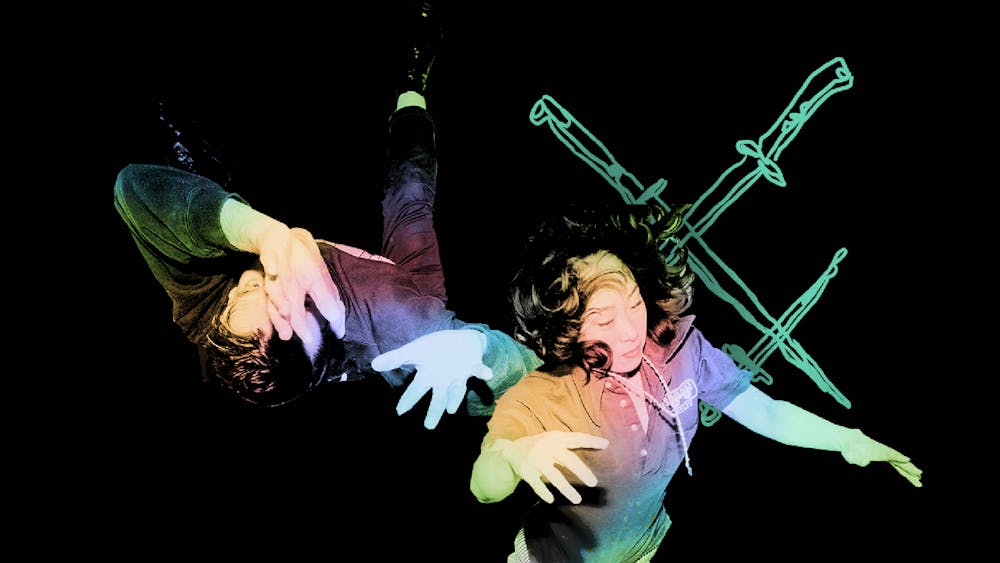In Xiu Xiu’s seventeenth studio album 13″ Frank Beltrame Italian Stiletto with Bison Horn Grips (henceforth Stiletto), Jamie Stewart and Angela Seo sacrifice none of their signature eccentricity. For artists of the avant–garde, navigating the fringes of artistic expression means bracing for critical rejection, facing an audience unsure of whether to recoil or lean in. Like every preceding Xiu Xiu album, Stiletto demands a little speculation. What’s it gonna be this time? For over 20 years, Xui Xui has defied all classification—every record a rebirth of genre and concept, weaving a narrative through the group’s discography. In this history, Stiletto is a chapter of change, inspired by their recent move to Berlin from Los Angeles and a “destruction of previous aesthetic notions,” according to the band. The record was mixed by Grammy award–winning producer John Congleton, who was granted a liberal dictum by the band to “go crazy.” But despite this approval, Stiletto, in the whole of the band’s work, might just be their most approachable project yet.
“Arp Omni” is a gorgeous inaugural track—vulnerable, delicate, and dripping with typical Xiu Xiu self–deprecation. Dissimilar from the rest of the album due to its simpler production, it might not be the most thrilling listen for some. However, Stewart’s standout vocal performance and stunning lyricism blazoned against a droning background of strings, act as a buffer to the rest of the album. The song unravels towards the end into a crashing cacophony of cymbals, heralding in the next track, “Maestro One Chord.” Here, we are thrown into a fire of noise—pounding loop beats, droning bass, and wicked synths—turbulent but coordinated. The result is almost psychedelic.
Stiletto’s most colorful tracks are also its rockiest. “Common Loon” has a dramatic, guitar–forward production that is enveloping, blissful even. By Xiu Xiu’s typical standards, this track is almost peppy, welcoming to those unacquainted with the group’s usual sound. The song's darker, less jovial twin, “Veneficium,” is a solid complement. Intense, bestial rock riffs fold into layers of bass and organ hanging in the background. The lyrics are vampiric, and the percussion, like in “Common Loom,” is the rock–forward focus of the track. It’s stellar work by David Kendrick, who’s only been with the band since their last full–length album, Ignore Grief, but has already emerged as a vital backbone to the group. Both tracks have come out as anthems of the album, leading the group’s most popular tracks on their Spotify profile, and exposing Xiu Xiu unlike anything we’ve seen in the last decade. With its long riffs and relentless energy, Stiletto is irrefutably a rock album, and in consequence, stands as the band’s most approachable work in years.
The record’s grungy, rock–heavy bits are paired beautifully with the haunting atmosphere that weaves its way through every track. Some songs lean more heavily into this dark, eerie theme than others, like “Pale Flower,” which has all of that Xiu Xiu high drama, but a simpler melody. “Sleep Blvd.” is a perfect combination of fast and calm, hard and delicate. It's really classic Xiu Xiu in many respects, with the youthful vocal register sounding like a callback to the group's earlier work and an explosive chorus adding contrast to the creeping unease throughout.
From this point forward, the album becomes its most intense and industrial. “Bobby Bland” is a decent listen, but its horror–camp crescendos feel more like a leftover sound palette from Ignore Grief than a cohesive part of this record. “T.D.F.T.W.,” on the other hand, handles the chaotic tension with a little more finesse. It's simply more entertaining, with the fantastic vocal interplay between Stewart and Seo, echoed over a wall of wailing tones and jagged guitar layers, bursting with an intensity that makes you feel like you’re losing your mind.
Stiletto finishes in a very different place than where it started. The calm and serenity from the first track are distant memories in “Piña, Coconut & Cherry,” which reaches the point of psychosis by its final notes. There is an obvious sense of abandon, with Stewart wailing in desperation, “I loved you this hard for twelve years / I never thought I could love this hard for so long / It makes me insane / You can't refuse love like this, it is criminal / You must love me, love me, love me.” By the end of the track, we are equally frantic and searching for release.
In Stiletto, Xiu Xiu presents a record that is both a distillation of their years of sonic experimentation and a shift toward something more accessible. It’s a complex record—one that lives in the tension between industrial chaos and melodic vulnerability. The group’s relocation to Berlin is emblematic of this transformation—stepping into new territory while still drawing from an ever–growing repertoire of sounds. For longtime fans, Stiletto may feel charming but mild, but for those just stepping into Xiu Xiu’s world, it could be the perfect gateway.

